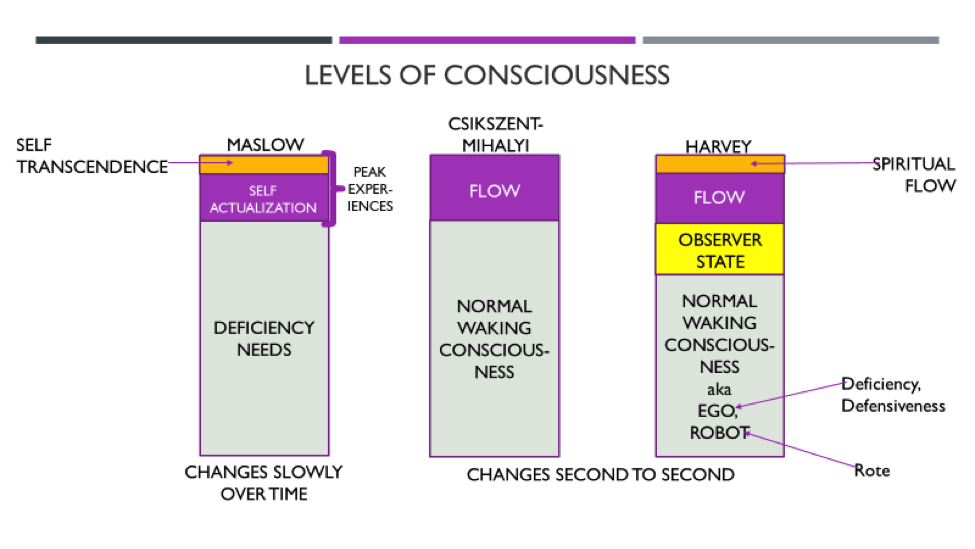Created December 11, 2020
Happy Chanukah, commemorating the rededication of the Second Temple in Jerusalem, the one that Jesus loved! Wishing you a glorious Festival of Lights!
This continues from the prior post. We are discussing how you can reach and stay longer in the higher states of consciousness, real states whose existence have been reported throughout history, and by distinguished scientists such as Abraham Maslow and Mihaly Csikszentmihalyi.
In the chart above I immodestly put myself on the same page as two of the greatest psychologists of all time. Not to seek to elevate myself to their class, but simply to compare what developed in my own worldview from my own experiences during a period in my life when I had heard of neither of these wonderful people.
To me what is interesting is how similar the three worldviews are!
As an applied scientist in the field of marketing and media science, such consilience is a suggestor that some objective truth is out there underlying three such similar although independently developed models. There is a higher state of consciousness, and probably a ladder of them, although the ladder idea is implicit in Maslow, and not mentioned in Mihaly’s work (or I missed it).
Maslow had said that the highest state available to humankind is self-actualization. And then, later in life he amended that to state that there was a higher level of self-transcendence. Peak experiences he said are the moment to moment manifestations of being in those upper states. For the average human, in the average moment, life was not a peak experience but a relatively drab one, laboring at tasks not selected by one’s own passionate interest but which pay the bills, and rescue one from penury, disdain, rejection and a sense of failure and worthlessness. The needs the average person experiences in the average moment are driven by the desire to avoid unwelcome outcomes and are pervaded by a sense of needing to compensate for one’s own deficiencies.
What does this mean for you? It points to a simple way you can check on your own state, as often as it occurs to you. The more your heart yearns for peak experiences and a life of fulfilment, the more often you will naturally check in on your own state. These states can fluctuate very rapidly, as you may have experienced yourself.
Maslow took the long view whereas both Mihaly’s work and my own are phenomenologies rather than typologies in that we focus on moment to moment changes. For example, the moment when one realizes one is in Flow state, can be the moment that kicks one immediately out of Flow state, so it is important to not let that happen by avoiding the reflex of gloating.
Mihaly focuses on how Flow arises when there is an equilibrium between the challenge and one’s own skill set. Psychologists Yerkes and Dodson found that the degree of arousal (how much one cares about winning) when at a midpoint causes maximum performance. Mihaly and these other folks were on the same page. In my own self-taught methods I found that I performed best when I had “burnt out” attachment to winning and was just watching to see what would happen when I just played the game for its own sake.
Takeaways so far from this post:
- Check in on your own state.
- If you find yourself having a Flow state experience beware of patting yourself on the back and just keep focused on what you are doing.
- If you are in a situation where you would like the highest performance from yourself, remember to focus on the doing and not on whether you will score high or low.
- Prepare yourself for this neutral, detached state starting well before the event, if possible. Visualize how you will act nobly whether you win or lose, literally visualize each outcome separately, and how you will behave if that moment comes.
As you can see from the chart above, my model is a bit more complex than the other two. I suspect that what Maslow referred to as spiritual or self-transcendent experiences, I refer to as Spiritual Flow. Under that the next level down in my model is Flow, where one is performing at one’s best effortlessly and without attachment to how well or poorly one is performing. Next step down is the Observer state, the doorway to the states above it.
You know when you are in the Observer state, not when the kibitzing narrator mind turns off, but when you can observe its workings and its fears and angers, without getting sucked into them, as if they are outside oneself.
In the state of normal waking consciousness, one tends to play tapes, say the same things over a lifetime, like a mechanical robot, and to be subject to irremediable lifelong pain depending on how others react to us – Maslow’s reference to “deficiency”, what I have always thought of as defensiveness or self-protectiveness.
Added takeaway:
- Note when you are in the Observer state. You may not be doing everything perfectly as in the Flow state, but you are keeping your detached witness identity and seeing what your lower mind is doing without be carried away by it. It’s highly conducive to Flow to happily remain in the Observer state for longer and longer periods of time.
You’ll also note that in the schema above I introduce the work of another philosopher of psychology by using the word “Ego” in the context of normal waking consciousness. Let’s start there in the next post.
My best to all,
Bill
Follow my regular media blog, In Terms of ROI at Media Village. Here is the link to my latest post.

